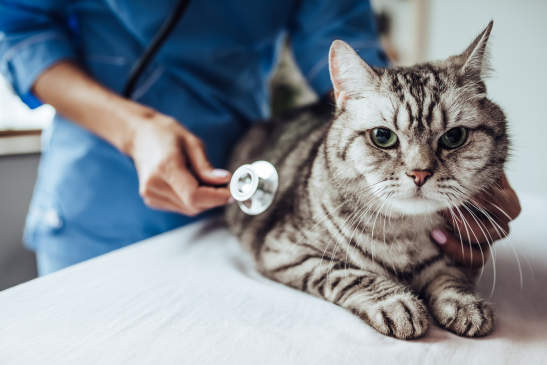In our Ask A Vet series, Pawp interviews Dr. Laura Robinson on Instagram Live about senior dogs and pet insurance. The questions we asked came from the Facebook group Ask A Vet. If you’d like a vet to answer your questions, join the group and post, or tune into the Instagram Live on Mondays at 1 pm. This interview with Dr. Laura Robinson has been transcribed and edited for length and clarity.
When Does A Dog Become A Senior?
In general, it's sometime between age 7 to 11. The larger the dog, the closer to 7. The smaller the dog, closer to 11. You have your Great Danes, they'd probably be considered a senior more like 7 or your German Shepherds, Rottweilers, more like 8. And you have your little Chihuahuas and Pomeranians and stuff where you're thinking more along the lines of 11.
What Are Signs Your Dog Is A Senior?
They can have different behavioral changes. You just notice that they're a little bit off. They'll have more loss of energy, sometimes a little confusion. Sometimes their sleep/wake cycles can be a little bit off. they'll also have some hearing and vision loss sometimes. Their teeth can get a little bit gnarly and especially in little dogs, you'll see tons and tons of tartar build up. They might start to lose their teeth. They start to lose their organ integrity, their skin elasticity. Sometimes their hair. They also get sick a little bit easier like old people too, just loss of immunity in general.
Sometimes they can have loss of their previous training, like remembering sit, stay, all that kind of thing. They can have different mobility issues like arthritis, loss of muscle tone. Sometimes they start gaining weight too. This is a great time to get your dog on supplements. But all those are great for senior dogs to give them the extra umph to get them going.

Should Senior Dogs Eat A Senior-Specific Diet?
Yes, get them on a senior diet. There are different nutrient profiles. They usually will start eating fewer calories in general because they're not expending as much as they used to each day. They also need more protein than they used to help them with trying to limit muscle loss and stuff like that. I always tell people to try to get them on a senior diet around the ages that I talked to and try to have it be a well-researched company. I always tell people, a lot of times people will come in and they're like, "Oh, my dog's on all life stages for a puppy to an adult to a senior." It's impossible to have a food that's all life stages.
You can't have a puppy eating senior foods. That's not just a branding thing. You do want to get them on a specific senior diet. And then there's also different things like if they're starting to have cognitive issues, there are different prescription diets and stuff for that too sometimes. You can talk to your vet about that. But those diets have things like healthy fats and antioxidants and stuff to help support that. And then if your dog's more like my dog, Jesse, for instance, she is starting to get arthritis and I started her on meds. I have her on a senior joint diet and they add fish oils and glucosamines and stuff like that. And I also have her on some joint supplements and stuff too. Getting them on that is a good idea too.
Will Keeping Your Dog Active Help Prevent Future Mobility Issues?
Every dog's a little bit different. A lot of it's a confirmation thing too. They can have underlying hip dysplasia and stuff, which my dog has. I knew about that already, so it was preemptively starting her on a lot of stuff. But a lot of the time when they do get older, you want to slow it down on the walks. And every dog's a little bit different, so I don't think there is really a set formula or something. Fifteen minutes for two times a day, anything like that. I think that's a good starting point.
With my dog Jesse, I probably take her on two 20-25 minute walks a day, but she does have arthritis, but I feel like she does extra. A certain day I take her on a longer walk. I will sometimes give her an anti-inflammatory medication to help because I can tell when she's looking stiff. If you overdo it one day and you notice the next day your dog's a little bit stiff walking around and moving a little bit slower, then maybe that's your answer to slow it down on the walks. I definitely don't think if your dog's a senior, you need to have him on multiple hours a day of exercise. I would say try to keep it under an hour for the day for sure.
Which Is More Likely To Develop Mobility Issues, An Active Or Inactive Dog?
It depends. It could be either one. I think there's more so things like them being overweight that definitely can contribute to them developing joint disease earlier. So you definitely want to keep their weight off as they get older because it just makes everything so much worse. I saw this really big Golden Retriever last week and the dog was 112 pounds and had arthritis in its hips, in its knees, and it just made everything worse because they can hardly stand up straight.
Weight is a huge thing. But yeah, you can overdo it for sure. If they already go super hard and a lot of dogs, they just have that drive that they just keep wanting to go and they keep wanting to fetch until they're literally on the ground panting, so out of breath.
It's sometimes up to you to be the ones to limit those things with them and just watch, keep a close eye on them. Make sure they're handling the amount of exercising you're wanting to give them okay. And there's other things you can do too, like watch the heat and the cold. Try to not take them out at really hot times of the day because dogs can overheat so you have to be careful of a lot those things.
And depending on the breed too, if you have any flat-faced dog like an English Bulldog or a French Bulldog or a Pug, you really have to be careful with heat in those dogs because they can really easily overheat. You have to take a little bit more into consideration with those and probably even do fewer walks and exercises just because of their confirmation. There are so many different things to take into account.
How Can You Tell If Your Dog Is Overweight?
It's more of a look to the dog. There's a really good website that I've mentioned before on these pawp lives. It's called the Ohio State University Basic Calorie Counter. You can go on there, it'll give you a body conditioning score sheet where you use the drawings and their examples to evaluate your own dog. They'll have for instance, if your dog has a little bit of a waist, if you can feel their ribs or not, if their bellies are tucked up or not, different things like that. And you can use these charts and then look at your own dog and see where they fall on the scale. And most of them are one through nine is the rating. And you want them to be about at a five, is the perfect weight.
You can use these charts and evaluate it. But the goal is you want your dog to have a little bit, or cat, to have a little bit of a waist. So it shouldn't be straight down for elbow to tail. It should go in a little bit after their ribs. Their ribs shouldn't be protruding, but you should, if you go down their sides and lightly, not push down really hard, but just lightly go down the sides of them, you should be able to feel their ribs a little bit.
Can A Cat Or Dog Be Naturally Overweight?
It's really hard because the calories a dog should eat and cat, they say it varies by up to 50%. You can get a general calorie amount for the pet, but I've seen dogs that come in, especially Labs seem to be one of the main ones that are really hard to get weight off of. And you have to have them on a lot lower calorie diet than you would a dog that similar weight from a different breed. They just have a slower metabolism. Just like people, dogs and cats can have different builds and they can, should be a little bit heavier. But I always tell people if we're working to try to get some weight off of them, we have to do it in a way to make sure that there's no underlying cause for them to be overweight.
Dogs, for instance, can get hypothyroidism where their thyroid level is too low. If I have a situation where I keep changing the calorie amount, but the dog's just not losing weight, then I would do routine blood work and stuff to make sure there's not an underlying cause for that. Or if there's a big tumor in its abdomen or something like that, where its belly's really big and you can't understand why it's getting bigger and bigger. Shoot x-rays, take blood work and that kind of thing. It's always good to make sure there's not an underlying cause for that.
Same thing with cats. If a cat's overweight, sometimes they can have diabetes and stuff too. Good idea to make sure there's no underlying cause for that. But cats can be a little bit deceiving because they have that belly fat underneath that's just extra and hangs down. That can sometimes make them look a little bit chubby.

How Do You Keep A Dog Mentally Stimulated As They Get Older?
Yeah. There's a lot of good things. Interactive dog toys are really good. There are some bowls that have little puzzles in them and you put the kibble in there and they have to figure out how to get them out of there. Those are good. There's also other interactive toys where you put a little treat in there and they have to figure out how to get it out. Or little puzzles and stuff like that. Anything that's mental stimulation for them. Switching out their toys every so often so they get stimulation with new toys. If you take them on walks, try to not take them on the same route each time. Mix it up a little bit so they're just getting different mental stimulation.
Sometimes I play hide and seek with my dog. Some dogs might not do this, there's no interest. But sometimes you can go hide in your house and have them come try to find you and give them a treat. Make your dog work for treats, teaching them new tricks. Sit, lie down, shake, that kind of thing. Fetch is always a good one. But all those things are just super great for lowering stress and anxiety. Keeping the dog calm, which all in the long run can help ward off diseases. Good thing to do for sure.
Are Dog Zoomies Normal?
Zoomies are just basically like pent-up energy that they've just been holding inside of them for too long and then all of a sudden something exciting or stressful happens and then it's just all of this release of energy at one time. It's this frantic, repetitive behavior where they'll start running in circles or spinning around or something like that. And it's usually associated with something either exciting or stressful. Sometimes first thing in the morning when they wake up. My old dog used to do it right after I'd give her a bath. She would just freak out and go digging in her bed and outside in the grass and would just get this burst of energy.
Sometimes it's also a stressful situation. They go to the vet and they get it when they come home or something like that. It's nothing to be concerned about if it's just situational like that. Especially puppies. Those are the ones that are going to do it multiple times a day even. Usually older dogs, it's more a situational thing. But nothing to be worried about as long as they're not running into things when they're running around, or injuring themselves. Or that it becomes so frequent that it's just constant all day long, multiple times a day.
Sometimes it can be more of an anxious thing if it's like that or either of the things that I mentioned that are good with lowering stress; they're not getting enough mental stimulation or physical stimulation where they just have all this pent-up anxiety and they don't know how to released it except spin in a circle chasing their tail for 30 minutes a day are something like that. Get them checked out or make some adjustments to your daily life with them.
Is It True Only 2% Of Pet Owners Have Pet Insurance?
I think that is pretty right. I don't think a lot of people have it, but I think it is becoming more popular, especially with millennial generation. It makes sense. Everything else we have insurance for: car insurance, medical insurance. Why wouldn't you have insurance for your own pet? But I do think it's about 2% definitely and with my clients, I think I see around that same percentage. I definitely think it's a great idea, especially for people that are on a budget. You're working on a budget every month, pay your rent and buy your groceries and all of that. And you're trying to be smart about your money. It's going to be a terrible day, if it comes, where you're faced with choosing treatment to basically help your dog in an emergency situation, but then not being able to afford it.

Is Pet Insurance Worth It If Your Dog Has Pre-existing Conditions?
I think in general, the earlier you can get pet insurance, the better, because no current pet insurance providers cover pre-existing conditions. The goal, if you wait too long for an issue to come up and all of a sudden your dog has skin allergies that you're going to be spending every year. There's no cure for those usually, so every year you're going to be spending a bunch of money dealing with their skin infections and itchiness. If you were to wait until a problem like that comes up and then try to get insurance there... There are a couple companies, I don't know tons of details about every single one, you'd have to do research, but a lot of the times if you wait for an issue to come up and then invest in insurance, you're not going to get as much benefit.
I tell people, I usually have this talk when people bring in a new puppy. There's multiple things that I'll talk about, but telling them about insurance and what I just told you about trying to get it earlier rather than later is always a good idea. If you're thinking about getting a dog or a cat, I definitely would look into getting insurance for sure.
Your typical vet visit is about 200 to 300 bucks in general across the country. And if you have a serious emergency, especially puppies, they get into something toxic, they swallow something that they shouldn't, you're looking at a couple thousand dollar surgery or hospitalization potentially. And that's a lot of money for someone to have to pay out of pocket. Especially puppies. They obviously get into a lot of stuff, so it's a good idea to get it with them.
But there are breeds too, like you were saying, that are going to cost more just because they're known to have more health issues. Like your English Bulldog, for example. It's definitely a huge cost and I know that sometimes I get really worried about my dog and I just run out to the vet and then you get some kind of crazy $200, $300 bill and in the end, there's nothing really wrong with her.
How Much Does A Pet's Dental Cleaning Cost? Or A Pet's Allergy Test?
To get tested for your environmental allergies, I think it's a $300 blood panel or a skin panel they have to send out to the labs. And then the dental cleanings are usually, it varies for sure because some dogs don't have any tartar on their teeth, some dogs have a ton. We do an anesthetized dental cleaning. That includes blood work and everything beforehand. And the anesthesia. I think a starting point for a dental... again, I'm in a richer area of California where I practice, so my probably starting point at $400 and up from there.
But I've had dogs come in where their teeth are so bad, they're 11-year-old Chihuahua or something with tons of tartar on their teeth. It can get up to $2000 if it's really bad. Yeah, you don't want to wait on the teeth issues. That's one of the main things that I see. Off topic, but the most neglected thing that I see.
